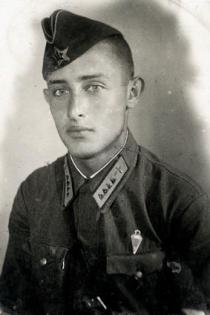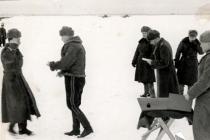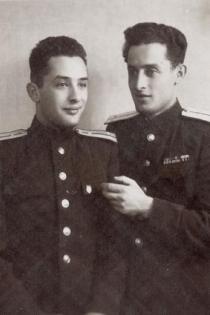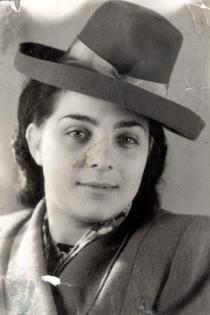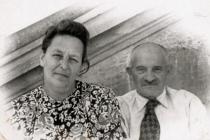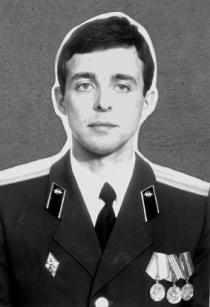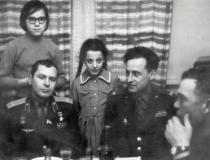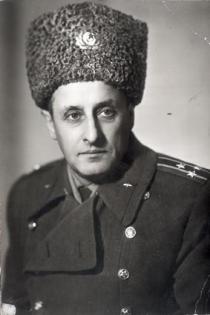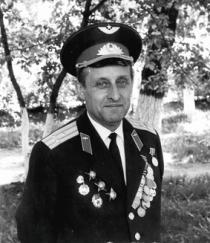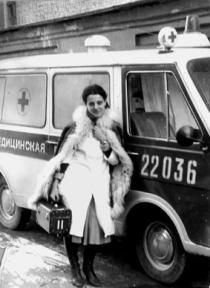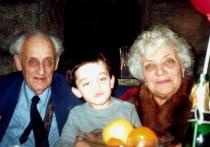This photograph is very dear for me. It was taken in 1943 in Andreapol.
Here you can see me receiving an Order of the Red Star. I’d like to tell you about the beginning of the war.
Early in the morning of June 22, 1941 we were alarmed. While running out of barracks I asked my comrade Lenya Minz 'Lenya, what happened?' And he answered 'Mikhail, war burst out.' A little bit later we were standing near a loud-speaker and listening to Molotov's speech.
He finished his speech with the following words: 'Our enemy will be defeated. We will celebrate victory.' During the first hours of war we came across manifestations of panic. People informed us that German troops had landed in the forest near our airdrome.
We immediately sent soldiers to search in the forest, but they found nobody. On the second day of the war our regiment first saw fire: we assisted our armies defending Ukraine. We began digging entrenchment's and preparing our planes for fighting missions.
Right after the beginning of war I was chosen the Komsomol leader of the regiment. It is necessary to say that in every military unit there were political officers. Besides there was a secretary of the local Communist Party Organization and a Komsomol leader.
So having no war experience, I became one of those leaders. According to the regiment hierarchy I became the sixth person in it, while my rank was only a first sergeant.
Before the war we fulfilled flights only in the daytime. But during the war we had to do it at nights. Once it was necessary for me to check some radio equipment in the air. It couldn't be helped, and I started. And (what a miracle!) it appeared that at night I could fly without any unpleasant feelings.
Since that time I started flying. You remember that I was a gunner. A lot of gunners were killed by that time, therefore I was ashamed for not participating in fighting missions. Besides I kept in mind that I was a Jew. I did not want somebody to say 'Of course, a Jew will never risk his life.' To tell the truth, I have to tell you that nobody reminded me about my nationality, but for some reason I felt greater responsibility.
I always realized that war time demanded people of different specialties: some of them probably never held weapon, they had to support the huge mechanism of war. I am far from considering their contribution to victory to be insignificant, but for me it was important to fight in the right way holding weapon in hands.
At the end of October 1941 our regiment shifted its base to Lipetsk near Moscow. It was hard time. Germans were spoiling for a fight. It was terrible to think about it, but sometimes it seemed that they would manage to capture Moscow.
German army moved along the road from Orel to Tula and we had to attack them from air. We succeeded in it: that road became a burial place of thousands of fascist soldiers, who tried to get to Moscow from the south. At the same time a lot of our military units had to fall back.
In December 1941 there came a long-awaited turning point at the front. Enemies were stopped and their running fight started from Moscow. Contribution of our regiment in it was great.
Our activities could be compared with emergency department work. Day and night we appeared where it was the most necessary for us to be at that moment. We waited for the order to start being already on boards our planes combat-ready.
I'll never forget my first fighting mission. I was a member of Stepan Kharchenko's crew. The flight was low-level. On the earth we saw a column of motor vehicles and a column of soldiers on the move. The commander ordered 'Fire!' The plane shook when I started firing. We saw our bullets tearing German lorries into pieces.
My heart beat with joy: from that day on I was able not only to fly, but also to fight! Since that day they started calling me the Fighting Komsomol Leader of the Regiment. I was proud of it.
I am somewhat previous telling you that during the war time I participated in 37 fighting starts. To tell the truth, it was not very easy: I used to be above the target, Germans fired at me from the earth, I used to lie face downwards behind a machine gun and fired back.
Our machine guns were worse than that of Germans. Later our plane was equipped with a gun, but it was not me who operated it (it was a radio operator who did it). As for me, I had to hit planes (so to say, to wound them), and he used to bring them down using the new gun.

